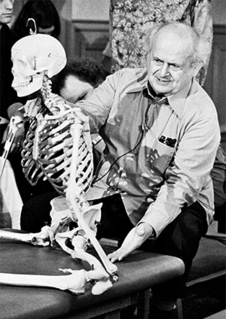Top 462 Sensitivity Quotes & Sayings - Page 8
Explore popular Sensitivity quotes.
Last updated on April 19, 2025.
One of the major symptoms of the general crisis existent in our world today is our lack of sensitivity to words. We use words as tools. We forget that words are a repository of the spirit. The tragedy of our times is that the vessels of the spirit are broken. We cannot approach the spirit unless we repair the vessels. Reverence for words - an awareness of the wonder of words, of the mystery of words - is an essential prerequisite for prayer. By the word of God the world was created.
In any communication, or in any situation which you cannot confront because it is exaggerating, hot or aggressive, just change your breath. Breathe through the lips instead of through the nostrils. Exhale always through the nostrils. Inhale through the rolled lips and make it slow and long. It will slow everything as required. It will increase your sensitivity. It will give you 10 times more projection over the person you are talking to.
It sometimes happened that you might be familiar with a man for several years thinking he was a wild animal, and you would regard him with contempt. And then suddenly a moment would arrive when some uncontrollable impulse would lay his soul bare, and you would behold in it such riches, such sensitivity and warmth, such a vivid awareness of its own suffering and the suffering of others, that the scales would fall from your eyes and at first you would hardly be able to believe what you had seen and heard. The reverse also happens.
If I hold a twenty pound weight, I cannot detect a fly landing on it because the least detectable difference in the stimulus is half a pound. On the other hand, if i hold a feather, a fly landing on it makes a great difference. Obviously then, in order to be able to tell the differences in exertion one must first reduce the exertion. Finer and finer performance is possible only if the sensitivity, that is, the ability to feel the difference is improved.
Learn to laugh. Seriousness is a sin, and it is a disease. Laughter has tremendous beauty, a lightness. It will bring lightness to you, and it will give you wings to fly. And life is so full of opportunities. You just need the sensitivity. And create chances for other people to laugh. Laughter should be one of the most valued, cherished qualities of human beings - because only man can laugh, no animals are capable of it. Because it is human, it must be of the highest order. To repress it is to destroy a human quality.
I think the act of reading imbues the reader with a sensitivity toward the outside world that people who don't read can sometimes lack. I know it seems like a contradiction in terms; after all reading is such a solitary, internalizing act that it appears to represent a disengagement from day-to-day life. But reading, and particularly the reading of fiction, encourages us to view the world in new and challenging ways...It allows us to inhabit the consciousness of another which is a precursor to empathy, and empathy is, for me, one of the marks of a decent human being.
The American way of stress is comparable to Freud's 'beloved symptom', his name for the cherished neurosis that a patient cultivates like the rarest of orchids and does not want to be cured of. Stress makes Americans feel busy, important, and in demand, and simultaneously deprived, ignored, and victimized. Stress makes them feel interesting and complex instead of boring and simple, and carries an assumption of sensitivity not unlike the Old World assumption that aristocrats were high-strung. In short, stress has become a status symbol.
There are, of course, inherent tendencies to repetition in music itself. Our poetry, our ballads, our songs are full of repetition; nursery rhymes and the little chants and songs we use to teach young children have choruses and refrains. We are attracted to repetition, even as adults; we want the stimulus and the reward again and again, and in music we get it. Perhaps, therefore, we should not be surprised, should not complain if the balance sometimes shifts too far and our musical sensitivity becomes a vulnerability.
The exaggerated dopamine sensitivity of the introvert leads one to believe that when in public, introverts, regardless of its validity, often feel to be the center of (unwanted) attention hence rarely craving attention. Extroverts, on the other hand, seem to never get enough attention. So on the flip side it seems as though the introvert is in a sense very external and the extrovert is in a sense very internal - the introvert constantly feels too much 'outerness' while the extrovert doesn't feel enough 'outerness'.
This focus on money and power may do wonders in the marketplace, but it creates a tremendous crisis in our society. People who have spent all day learning how to sell themselves and to manipulate others are in no position to form lasting friendships or intimate relationships... Many Americans hunger for a different kind of society - one based on principles of caring, ethical and spiritual sensitivity, and communal solidarity. Their need for meaning is just as intense as their need for economic security.
I always thought my days spent in darkness [as a child she had cataracts and was unable to see for nearly four years] gave me a very special sensitivity. Much later, when I really wanted to hear, really 'see' a song, I'd close my eyes, and when I wanted to bring it out of the very depths of myself, out of my guts, out of my belly, when the song had to come from far away, I'd close my eyes.
For me, spirituality includes the belief in things larger than ourselves, an appreciation of nature and beauty, a sensitivity to the world, a feeling of shared connection with other living things, a desire to help people less fortunate than ourselves. All of these things can occur with or without God. I do not believe in the existence of God, but I consider myself a spiritual person in the manner I have just described. I call myself a spiritual atheist. I would imagine that many people are spiritual atheists.
This, then, is the ultimate, that is only, consolation: simply that someone shares some of your own feelings and has made of these a work of art which you have the insight, sensitivity, and — like it or not — peculiar set of experiences to appreciate. Amazing thing to say, the consolation of horror in art is that it actually intensifies our panic, loudens it on the sounding-board of our horror-hollowed hearts, turns terror up full blast, all the while reaching for that perfect and deafening amplitude at which we may dance to the bizarre music of our own misery.
There are so many different ways to talk and think about art. We just spoke about when attitude becomes form. But when I was a kid, I had these two art teachers, a couple, who were continuing a line of very classical, atelier art training, and they instilled in me a sensitivity to all the classical verities of line, shape, color, texture, and composition, which is only engaging if you're making two-dimensional objects.
We are continuously looking at the question of increasing the capacity of Home Affairs and that is why Home Affairs introduced mobile units, to be able to reach people. The matter of the establishment of the Social Security Agency was to deal with the matter of the more efficient distribution of these grants, the reductions in the levels of corruption and greater sensitivity. You are dealing with vulnerable people, like the elderly, who you needed to find a way of addressing, so that people don't have to be waiting in the sun in the queue, and so on.
If there's one thing I feel very strongly about, it's that there shouldn't be a distinction between pianists who play Ligeti and those who play Chopin. It might seem that they involve different skill sets, but I don't think that's true: whether playing Ives or Bach or Beethoven, you must bring the same imagination, the same sensitivity, and an ability to deal with same kinds of musical problems. The method behind my madness, anyway, is to keep plugging away at this idea.
Now, some people might look at something and let it go by, because they don't recognize the pattern and the significance. It's the sensitivity to pattern recognition that seems to me to be of great importance. It's a matter of being able to find meaning, whether it's positive or negative, in whatever you encounter. It's like a journey. It's like finding the paths that will allow you to go forward, or that path that has a block that tells you to start over again or do something else.
You have no sensitivity that your soul shall leave in the subtle body and that your subtle body is as sophisticated as anything in the universe can be. So unless you produce in yourself elegance, grace, sophisticatedness in your mind, manners and attitude, and unless you come from the infinite altitude, and ascend to that altitude, you cannot descend in love. The higher is your being, the deeper is the love.
The Gnostics believed that exile was the essential condition of man. Do you agree? I do. The artist and the addict both wrestle with this experience of exile. They share an acute, even excruciating sensitivity to the state of separation and isolation, and both actively seek a way to overcome it, to transcend it, or at least to make the pain go away. What is the pain of being human? It's the condition of being suspended between two worlds and being unable to fully enter into either.
Writing is for stories to be read, books to be published, poems to be recited, plays to be acted, songs to be sung, newspapers to be shared, letters to be mailed, jokes to be told, notes to be passed, recipes to be cooked, messages to be exchanged, memos to be circulated, announcements to be posted, bills to be collected, posters to be displayed and diaries to be concealed. Writing is for ideas, action, reflection, and experience. It is not for having your ignorance exposed, your sensitivity destroyed, or your ability assessed.
Gratitude is a SpiritEUR'filled principle. It opens our minds to a universe permeated with the richness of a living God. Through it, we become spiritually aware of the wonder of the smallest things, which gladden our hearts with their messages of God's love. This grateful awareness heightens our sensitivity to divine direction. When we communicate gratitude, we can be filled with the Spirit and connected to those around us and the Lord. Gratitude inspires happiness and carries divine influence.
God uses suffering to purge sin from our lives, strengthen our commitment to Him, force us to depend on grace, bind us together with other believers, produce discernment, foster sensitivity, discipline our minds, spend our time wisely, stretch our hope, cause us to know Christ better, make us long for truth, lead us to repentance of sin, teach us to give thanks in time of sorrow, increase faith, and strengthen character.
Because I'm playing Dirk Gently [ in Dirk Gently's Holistic Detective Agency], I'm so fond of Dirk. I really see Dirk's vulnerability, and you get that, more and more. You'll start to see a little bit more of Dirk's backstory, why he behaves the way he does, and why he's doing what he's doing. I see a lot of his vulnerability, his sensitivity and his insecurity.
In polite society, there is such a thing as sensitivity to some issues, as time has gone on. There was a time when we weren't politically correct, at all, and we all wince at moments when we look to the past and see that. I don't really know what the answer is, as far as that is concerned. However, me, as an artist, I don't really think about it, at all. It actually is not my job to think about that, especially in terms of me, as a writer, but also as a filmmaker. I'm not worried about the filmmaking part because, if I'm writing it, that's what I'm going to do.
Instead of a bottom-line based on money and power, we need a new bottom-line that defines productivity and creativity as where corporations, governments, schools, public institutions, and social practices are judged as efficient, rational and productive not only to the extent they maximize money and power, but to the extent they maximize love and caring, ethical and ecological sensitivity, and our capacities to respond with awe and wonder at the grandeur of creation.
When philosophers talk about reason they often have in mind Having been in the business of philosophy more than half my life, I have learned that reason doesn't change many minds. But there's a more ordinary sense of resonableness, which involves not just logic but a sensitivity to other peoples real concerns, a desire to understand, even when you don't agree. Many people are reasonable in this way.I'm willing to think that the world will be made better by the conversations of reasonable people, even if there are unreasonable people and people who don't want to converse as well.
Educational bureaucracies dull a child's questing sensitivity. The young must be dampened down. Never let them know how good they can be. That brings change. Spend lots of committee time talking about how to deal with exceptional students. Don't spend any time dealing with how the conventional teacher feels threatened by emerging talents and squelches them because of a deep-seated desire to feel superior and safe in a safe environment.
I enjoyed meeting Emma [Watson]. I have a soft spot in my heart for child actors growing up. I know how hard that is. Having gone through that experience myself, I have a lot of sensitivity to it. For lack of a better word, I just feel like I love these kids, and I want them all to grow up and love themselves, and not get caught up in the wrong things, and to learn all the different things this profession has to give, and to understand it.
Not only does the modern person often think that sight is more important than sound - there's no objective evidence to indicate that. Many people, even audiologists who study the science of human speech and hearing, have assumed for a long time that the human ear evolved to hear the human voice, rather than the voice changing to fit the human ear. And the human ear is actually not a perfect match if we map its sensitivity to the different frequencies in the human range of hearing; it's an unequal curve, it's kind of a wavy line.
Actually, I can't stand watching violent scenes in films; I avoid watching horror films. I don't tend to watch action films mainly because I find them boring, but I watch the films of David Cronenberg and Martin Scorsese, usually in a state close to having a heart attack. I'm a complete coward. I make violent films as a result of my sensitivity to violence - in other words, my fear of violence.
It was, just as Kinski had predicted, suicide. He should never have done it. It is widely held by those who knew him, and Kinski himself, that he never recovered from Woyzeck. But what was the ultimate result? If you are the viewer of this film, Kinski's portrayal shocks your feelings out of the vault of intellectualizing or passive observing. He forces you to feel with him, to align yourself with your buried emotions. He outs your sensitivity. Is this not something Christ-like? It is, for my money. Kinski is the pure cure for the 21st-century disease - the numbness unto droning.
Something that had an enormous influence over my relationship with language was my stammer. I had a really bad stammer in my childhood and adolescence, and that imbues you with two things. First, a hyper-sensitivity to grammar, because a stammerer will have problematic sounds, impossible verbal stumbling blocks. Second, writing is just such a joy when you have a problem with speaking. It's so astonishing to watch language coming out of your pen without any hesitation or dysfluency.
When I was in my teens I had a series of intensely religious experiences. They deepened my sense of God as the creator of all things. And they also deepened my sensitivity towards creation itself so that concern for God's creatures and animal rights followed from that. Some people think I'm an animal rights person who just happens, almost incidentally, to be religious. In fact, it's because I believe in God that I'm concerned about God's creatures. The religious impulse is primary.
Mothers have not always had the most important role in their children's upbringing, when they had other economic roles to play. Inpast centuries, fathers were the key parent in the upbringing of the next generation, because moral training, not emotional sensitivity, was thought to be central to successful child-rearing. Mothers were thought to corrupt their little ones with too much affection and not enough stern training.
It is important to know when you feel down that many others do also and that their circumstances are generally much worse than yours. And it’s important to know that when one of us is down it becomes the obligation of his friends to give him a lift. I hope that each of us will cultivate a sensitivity toward the feelings of others and when encouragement is needed make an effort to extend it. Be a friend and you will have a friend. God be thanked for wonderful friends.
Once Steve Fuller said that there is this idea that your responsibility as an intellectual is just to speak the truth as you see it. But actually, you should be more appreciative of what needs to be said. I don't think that's ever an excuse to say something you don't believe is true - but sometimes the emphasis has to be different. Well, if I'm talking to an audience of hardline atheists, I'll be trying to unsettle them a bit more, whereas, if I'm speaking to an audience of believers, I'll be giving them more of the pros of atheism. It's about having a sensitivity to context.
I just feel like there's something to be said about feeling comfortable with what you have and don't have. And - for instance, I don't think I'm particularly a great singer, but I feel like I write songs that complement my voice, you know, and I feel like it's unique. And I don't feel like I'm particularly a great actor, for instance, but I feel like I approach each thing that I do with some level of sensitivity. And I would say that comedy in general is the most disarming.
I always say people would rather be nice than right. I like to be nice too, but come on. People frequently ask me, what is my definition of politically correct. My answer is always the same: the elevation of sensitivity over truth. People would rather be nice than right, rather be sensitive than true. Well, being nice and sensitive are important, but they're not more important than being right; they're not more important than the truth.
There is no doubt that the princess did become a queen---not only on the screen. One of the most loved, one of the most skillful, one of the most intelligent, one of the most sensitive, charming actresses---and friends, in my life---but also in the later stages of her life, the UNICEF ambassador to the children of the world. The generosity, sensitivity, the nobility of her service to the children of the world and the mothers of the world will never be forgotten.
The meaning and the purpose behind some events are unknowable. This is the ultimate test of our faith. We must trust that everyone in life is here to learn different lessons at different times, that good and bad experiences are only the perceptions of man. After all, some of your worst experiences have truly been your best. They've sculpted you, trained you, developed within you a sensitivity and set you in a direction that reaches out to impact your ultimate destiny.
With every character you play you're always trying to put facets of yourself into those characters. I think Asher, at the beginning of The Giver, when he's goofy and a little bit of a rule-breaker, a little bit of a jokester, I align with him. But then he kind of transforms throughout the movie and becomes someone I don't necessarily relate to. I relate to Adam McCormick's sensitivity. He's more quiet and introverted, and I definitely have those moments as well.
Joss Whedon writes beautiful drama. His sensitivity and his sense of drama and scenes are pretty exceptional. There's no one else writing like him, really, in sci-fi and TV. That's not to say there are no astonishing writers on TV. I was nervous about coming to America and playing an English person who speaks very English when all the writers are American, because it's a very particular thing to imitate, and if it's badly imitated, it sounds painfully contorted and silly. And he writes very well for English people. It was Joss Whedon who persuaded me.







































